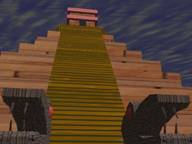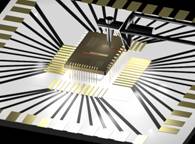|
Virtual
reality offers an exciting new way to increase guest participation and
generate excitement for the museum and its exhibits. Guests will learn
more about an exhibit than they ever dreamed– virtual reality allows
guests to truly step inside of an exhibit. Instead of looking at
pictures or watching videotape, guests step inside and actively explore
new worlds such as foreign countries, ancient societies, a computer, or
the human body. Museum learning in virtual reality is extraordinarily
compelling, an excellent addition to any exhibit.
An exhibit
based on the remains of dinosaur bones is brought to life in virtual
reality, with guests observing the dinosaur’s habitat, watching them
feed, and even running from (!) carnivorous dinosaurs. Traditional
museum exhibiting supplemented by virtual reality is truly powerful
learning tool surpassed by nothing else. In the eternal quest to
teach, engage, and fascinate, museums today have a unique historic
opportunity to introduce virtual reality in the context of their
museums, an unparalleled opportunity to enhance the image, reputation,
and relevance of museums today.
Supplementing an exhibit with virtual reality greatly increases guest
interactivity with it. They literally become a part of the exhibit.
Guests pilot a virtual reality version of an aircraft or submarine being
exhibited, landing in Paris among cheering throngs in Charles Lindburg’s
Spirit of St. Louis, or searching for German U-boats in World War II. An
exhibit based on computer technology now allows guests to travel inside
of a computer to understand how it works. In virtual reality, we are
limited only by our own imaginations.
Museum Education
Virtual
reality can become a valuable part of museum education, bringing great
interest and excitement to a museum’s educational efforts. A virtual
reality lab is the ultimate learning resource for museum students. The
lab is used similarly to the way today’s computer and language labs are
used. Classes, at different parts of the day, use the lab to supplement
traditional learning. A rapidly growing library of courseware allows
virtual reality learning to be enjoyed by dozens of different classes.
Portable
virtual reality allows museum education departments to (literally) take
the museum to area schools and special events to capture attention and
get students and teachers alike involved with museum education programs.
|
|
|
| |

A
virtual trip to ancient Mexico |
|
| |

Inside a computer |
|
| |

Playing with Virtual DNA |
|
|